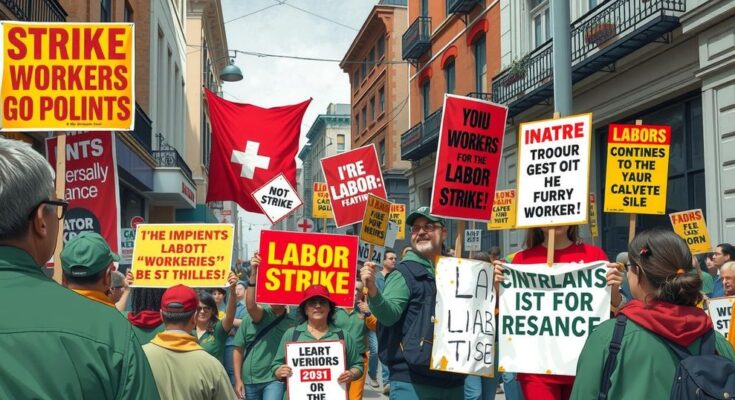Colombia’s labor unions are on a 48-hour strike supporting President Gustavo Petro’s push for a referendum on labor law reforms. This strike follows repeated rejections of reform proposals by Congress, with significant protests in major cities. The president may issue a decree to activate the referendum if lawmakers do not act.
Colombia’s labor unions commenced a significant 48-hour strike on Wednesday, rallying behind President Gustavo Petro’s proposed referendum. This referendum aims to allow voters to decide on a sweeping overhaul of the country’s labor laws, showcasing the unions’ discontent over stalled reforms in Congress. The work stoppage signals a pressing demand for change, directly stemming from Petro’s concerns that lawmakers have repeatedly opposed measures beneficial to workers.
The context of this strike arises from the ongoing tensions between the executive and legislative branches. President Petro has claimed that Congress continues to block vital labor reforms, having twice rejected his proposals to improve labor conditions. Most recently, in March, Congress turned down his labor reform initiative, prompting Petro to present a 12-question referendum to lawmakers on May 1. However, when lawmakers voted against it by a narrow margin of 49-47 two weeks later, tensions intensified, leading Petro to accuse them of undermining the will of the people.
Striking union leaders voiced frustration with legislative inaction. “We are telling the Senate that it cannot continue legislating against the working class,” stated Fabio Arias, the head of the United Workers’ Central. He emphasized the need for the referendum to restore workers’ rights, with expectations that around three million workers would join the protests.
Demonstrations unfolded across Colombia’s major urban centers, with significant activity reported in the capital, Bogota. Protesters actively blocked public transportation routes, disrupting daily commutes for thousands. Union member Yeimy Cante Toro articulated her sentiments, saying, “I’m mobilizing because I feel that my rights have been violated.”
In light of the unfolding situation, Interior Minister Armando Benedetti announced on Tuesday that Petro would issue a decree on June 1 to authorize the referendum should Congress fail again to act on it. This development is poised to further exacerbate existing tensions, particularly as the president seeks to solidify his profile ahead of the 2024 elections as Colombia’s first leftist leader, who is eligible for re-election.
The discord between Petro and Congress has been mounting since he took office in 2022. Political analyst Mauricio Velásquez points out that the rejection of labor reforms has effectively given Petro a strategic opportunity, allowing him to shift the narrative and mobilize public support against legislative inaction. “Congress gave the government a lifeline at a moment of great weakness,” he noted, suggesting that this dispute could shape the political landscape as the elections approach.
In summary, Colombia’s labor unions initiated a 48-hour strike in solidarity with President Gustavo Petro’s referendum aimed at labor law reform. The discontent stems from Congress’s repeated blockage of proposals intended to protect workers’ rights, leading to public demonstrations in major cities. With the looming possibility of a presidential decree to authorize the referendum, the ongoing conflict between the executive branch and Congress is poised to have significant implications for the country’s political future.
Original Source: www.independent.co.uk




